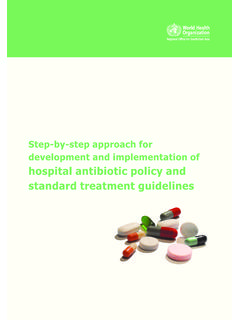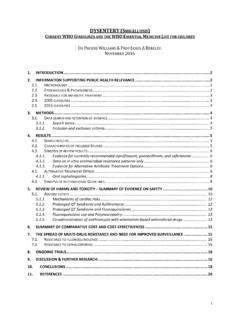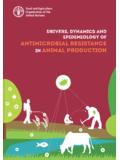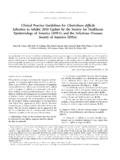Transcription of Treatment Guidelines for Antimicrobial Use in …
1 Treatment Guidelines for Antimicrobial Use in Common Syndromes Indian Council of Medical Research Department of Health Research New Delhi, India 2017 1 Foreword Emergence of Antimicrobial resistance(AMR) in pathogens of public health importance is globally recognised as a threat to human health. It is well known that Infections caused by Antimicrobial -resistant micro-organisms in hospitals are associated with increased morbidity, mortality and healthcare costs. Antimicrobial resistance is closely linked to inappropriate Antimicrobial use and selection and spread of resistant microorganisms in the presence of antimicrobials is facilitated by irrational use of drugs, self-medication and misuse of drugs. Recognizing the need for having a nation wide evidence on AMR, ICMR initiated putting together AMR surveillance network in 2013.
2 Using the data from the ICMR s AMR surveillance network of last two years, ICMR has developed evidence based Treatment Guidelines for Treatment of ten syndromes of infections. It gives me immense pleasure to inform you that country s leading infectious disease physicians and clinical microbiologists, both from public and private sector, have contributed to the compilation of this document. We are thankful to all the experts who contributed to the Guidelines as well as those who reviewed it. It is estimated that 50% or more of hospital Antimicrobial use is inappropriate. We hope that this document will be instrumental in guiding the Treatment and will bring down inappropriate prescriptions. I hope that this document will be of immense help to medical practitioners, hospital administrators, doctors and will be helpful in bringing down the burden of AMR in the country.
3 Dr Soumya Swaminathan, Director General, Indian Council of Medical Research Secretary, Department of Health Research 2 Guideline Development Process The publication of the of the Antimicrobial Treatment Guidelines represents the culmination of the efforts of the Antimicrobial Stewardship Program of ICMR to publish Treatment Guidelines for common syndromes in India. These Guidelines are targeted for the health care settings. It aims to rationalize the usage of antibiotics on our Essential Medicines Formulary (EMF) and to establish consistency in the Treatment of various infectious conditions ICMR established AMR surveillance network in 2012 to collect nationally representative data on trends and patterns of AMR to the commonly used antibiotics. A working group on Antimicrobial Stewardship Program (AMSP) was simultaneously constituted in late 2012 to provide overall direction to development of AMSP in the country.
4 One of the key recommendations of the group was to devise standard Treatment Guidelines , based on Indian data, which can guide antibiotic usage in the country. The process began with identification of ten syndromes for which Treatment Guidelines was to be framed. The country s leading infectious disease physicians and clinical microbiologists from leading medical organisations were assigned this task of compilation and review. The data emanating out of the ICMR network was shared with all the teams. The document was compiled to give it the present shape. All recommended therapies are either evidence-based or universally accepted standards. These are general Guidelines ; Treatment of individual patients may vary depending upon local conditions and experience. Dr Kamini Walia, Dr V C Ohri Scientist E and Program officer AMR Consultant AMR, ICMR Division of ECD, ICMR Please send your comments or feedback on Guidelines to subject ICMR Treatment Guidelines .
5 3 Instructions to users of Antimicrobial Guidelines There is no denying the fact that our country lacks proper Anti microbial Guidelines (AMGL) for empiric management of infections. Most of AMGLs available are based on pathogenic bacteria and easily available authentic western literature. Instead AMGL should be syndromic and based on reliable Indian Antimicrobial resistance (AMR) data. The empirical management must be altered in 48-72 hours according to Antimicrobial susceptibility test report data on isolation of specific pathogen(s) causing infection. With these issues in background, Indian Council of Medical Research (ICMR) embarked on preparation of AMGL for 10 more important infective syndromes based on ICMR Antimicrobial Resistance Surveillance Network (AMRSN) data as part of its Antimicrobial Stewardship Program.
6 Basic components of these AMGLs are Definition of syndrome, Clinical aspects, likely Investigations, ICMR AMR data, Schedule of Antimicrobial management, References, Editorial Board (consisting of Infectious Diseases Physician/Clinician, Clinical Microbiologist, Pharmacologist ). However a clinician managing an infection is well advised not to follow these AMGLs blindly but customize these in accordance with local AMR data. AMR data is known to differ between different Health Care Institutes of the country and even between different clinical departments of same Health Care Institute. Hence each Health Care Institute and each Clinical department must customize their respective AMGL accordingly using ICMR AMGL as basic rational format. 4 Contents 1. Management of Community - onset Acute Undifferentiated Fever in adults 5 2.
7 Antimicrobial Guidelines for the Management of Antibiotic Associated Diarrhea 15 3. Antimicrobial Guidelines for prophylaxis and Treatment of Infections in Bone Marrow Transplant settings 20 4, Antimicrobial Guidelines for Device Associated Infections 33 5. Antimicrobial Guidelines in immune-compromised hosts and solid organ transplant recipient 47 6. Antimicrobial Guidelines for Infections in Obstetrics and Gynaecology 61 7. Principles of Initial Empirical Antimicrobial Therapy in Patients with Severe Sepsis and Septic Shock in The Intensive Care Units 74 8. Antimicrobial Guidelines for prophylaxis and Treatment of Surgical Site Infections 88 9. Antimicrobial Guidelines for Upper Respiratory Tract Infections 98 10. Antimicrobial Guidelines for Urinary Tract Infections 102 5 Management of Community - onset Acute Undifferentiated Fever in Adults 1. Outline: The purpose of the Guidelines is to ensure appropriate Antimicrobial Treatment while at the same time limiting the inappropriate use of antibiotics in the management of infections by addressing issues like antibiotic selection, dosing, route, duration, adverse drug events, and cost and prevention of unintended collateral damage.
8 2. Some general principles: i. Antibiotic use will need to be classified with respect to type (high- and low-risk) and the patient s place in the Treatment pathway (untreated, treated, and post- Treatment ). ii. The choice of medication may vary depending on differences in the case mix of patients, various drugs (of same or different class) listed in formulary or clinical practice Guidelines already in place at different institutions in similar patient care locations. iii. Timely use of diagnostic tests or documentation of symptoms supporting the presence of infection would be best. Cultures (two sets of blood cultures and other appropriate samples as clinically indicated normally sterile body fluids, deep pus etc.) should be taken before starting empiric antibiotic Treatment . iv. Empiric antibiotic Treatment for common infections should be limited to conditions where early initiation of antibiotics has been shown to be beneficial, eg severe sepsis and septic shock, acute bacterial meningitis, community acquired pneumonia, necrotizing fasciitis, etc.
9 V. Reassessment of the situation within 48 hours based on the test results and examination of the patient is required. If needed, the drug's dosage and duration can be adjusted or the antibiotic regimen should be de-escalated (to the narrowest spectrum, least toxic and least expensive antibiotic) based upon patient response and culture and susceptibility reports. 3. Case Definition i. Previously healthy (non-immunosuppressed) community (urban or rural) dwelling adult (ages 19-64 yrs) reporting no previous medical illness or recent hospitalization (in the preceding 30 days) presenting with acute onset of fever > C ( F) for > 2 days and lasting up to 14 days and having received no specific Treatment for this current illness with antimalarials or antibiotics. ii. Seen in ambulatory care settings at the primary level (PHC), doctor s office/clinic, emergency room in a community Hospital, including referrals from primary health care or community physicians.
10 6 iii. With history of no localizing symptoms (except accompaniments of fever such as chills, headaches, retro-orbital pain, myalgia, malaise, nausea or vomiting). On examination found to have normal vital signs (excepting fever) and lacking organ or system specific physical signs.* * A complete and thorough physical examination is mandatory. Record of vital signs is essential. A search is required for hidden foci such as throat examination, sinus tenderness, renal or hepatic tenderness, heart murmurs, chest examination, lymph nodes and splenomegaly. Fundus examination (if headache or bleeding tendency) and examination of the skin for eschar and petechiae or purpura must be made. 4. Common pathogens causing tropical fevers , seasonal fevers endemic /epidemic /outbreak fever , monsoon fever : i. Suspect malaria in all cases of acute undifferentiated fever (there are no key differentiating features between this and other causes (see below).)




